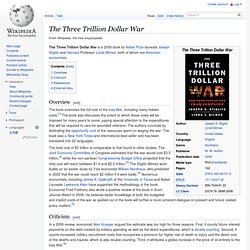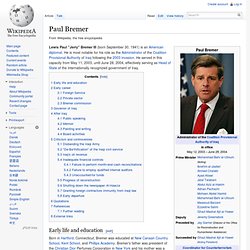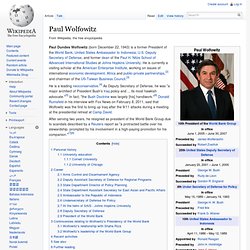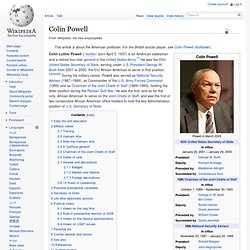

Jeffreyalanmiron.typepad.com/bs.pdf. Www.unhcr.org/refworld/pdfid/402ba99f4.pdf. The Three Trillion Dollar War. The Three Trillion Dollar War is a 2008 book by Nobel Prize laureate Joseph Stiglitz and Harvard Professor Linda Bilmes, both of whom are American economists.

Overview[edit] The book examines the full cost of the Iraq War, including many hidden costs.[1] The book also discusses the extent to which these costs will be imposed for many years to come, paying special attention to the expenditures that will be required to care for wounded veterans. L. Paul Bremer. Lewis Paul "Jerry" Bremer III (born September 30, 1941) is an American diplomat.

He is most notable for his role as the Administrator of the Coalition Provisional Authority of Iraq following the 2003 invasion. He served in this capacity from May 11, 2003, until June 28, 2004, effectively serving as Head of State of the internationally recognized government of Iraq. Early life and education[edit] Born in Hartford, Connecticut, Bremer was educated at New Canaan Country School, Kent School, and Phillips Academy. Bremer's father was president of the Christian Dior Perfumes Corporation in New York and his mother was a lecturer in art history at the University of Bridgeport.
Bremer graduated from Yale University in 1963 and went on to earn an MBA from Harvard University in 1966. Early career[edit] Foreign Service[edit] That same year he joined the Foreign Service, which sent him first to Kabul, Afghanistan, as a general services officer. Private sector[edit] Paul Wolfowitz. He is a leading neoconservative.[4] As Deputy Secretary of Defense, he was "a major architect of President Bush's Iraq policy and ... its most hawkish advocate.

"[5] In fact, "the Bush Doctrine was largely [his] handiwork. "[6] Donald Rumsfeld in his interview with Fox News on February 8, 2011, said that Wolfowitz was the first to bring up Iraq after the 9/11 attacks during a meeting at the presidential retreat at Camp David. After serving two years, he resigned as president of the World Bank Group due to scandals described by a Reuters report as "a protracted battle over his stewardship, prompted by his involvement in a high-paying promotion for his companion Personal history[edit] The second child of Jacob Wolfowitz (1910–1981) and Lillian Dundes, Paul Wolfowitz was born in Brooklyn, New York, into a Polish Jewish immigrant family, and grew up mainly in Ithaca, New York, where his father was a professor of statistical theory at Cornell University University education[edit]
Colin Powell. Early life and education Despite his parents' pronunciation of his name as /ˈkɒlɨn/, Powell has pronounced his name /ˈkoʊlɨn/ since childhood, after the heroic World War II flyer Colin P.

Kelly Jr.[10] Public officials and radio and television reporters have used Powell's preferred pronunciation. Military career Training Powell described joining the Reserve Officers' Training Corps (ROTC) during college as one of the happiest experiences of his life; discovering something he loved and could do well, he felt he had "found himself.
" “It was only once I was in college, about six months into college when I found something that I liked, and that was ROTC, Reserve Officer Training Corps in the military. Cadet Powell joined the Pershing Rifles, the ROTC fraternal organization and drill team begun by General John Pershing. Vietnam War. Uncovered: The War On Iraq. Iraq: The Reckoning. Peter Oborne, political editor of the Spectator, reports on the West's exit strategy for Iraq.

He believes the invasion of Iraq is proving to be the greatest foreign policy failure since Munich. Oborne argues that the plan to transform Iraq into a unified liberal democracy, a beacon of hope in the Middle East, is pure fantasy. Reporting on location with US troops in Sadr City, and through interviews with leading figures in Britain and the US, Oborne argues that the coalition and its forces on the ground are increasingly irrelevant in determining the future of Iraq - a future that's unlikely to be either unified, liberal or democratic. The film includes interviews with Richard Perle, Peter Galbraith, Deputy Chief of Army staff General Jack Keane. Oborne also interviews Rory Stewart, who worked as a deputy governor in Nasyriah and witnessed first hand the rise of the pro-Iranian fundamentalist parties that are now at the heart of the Iraqi government.
No End in Sight.